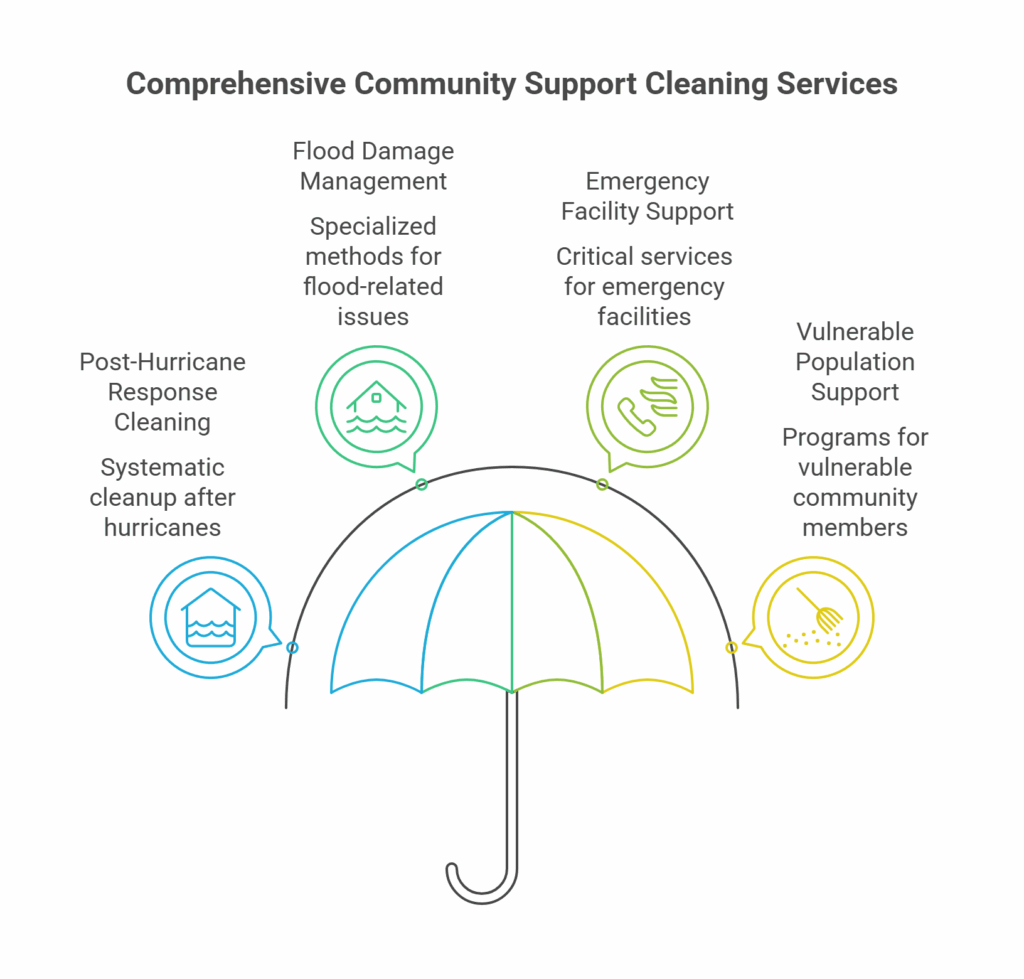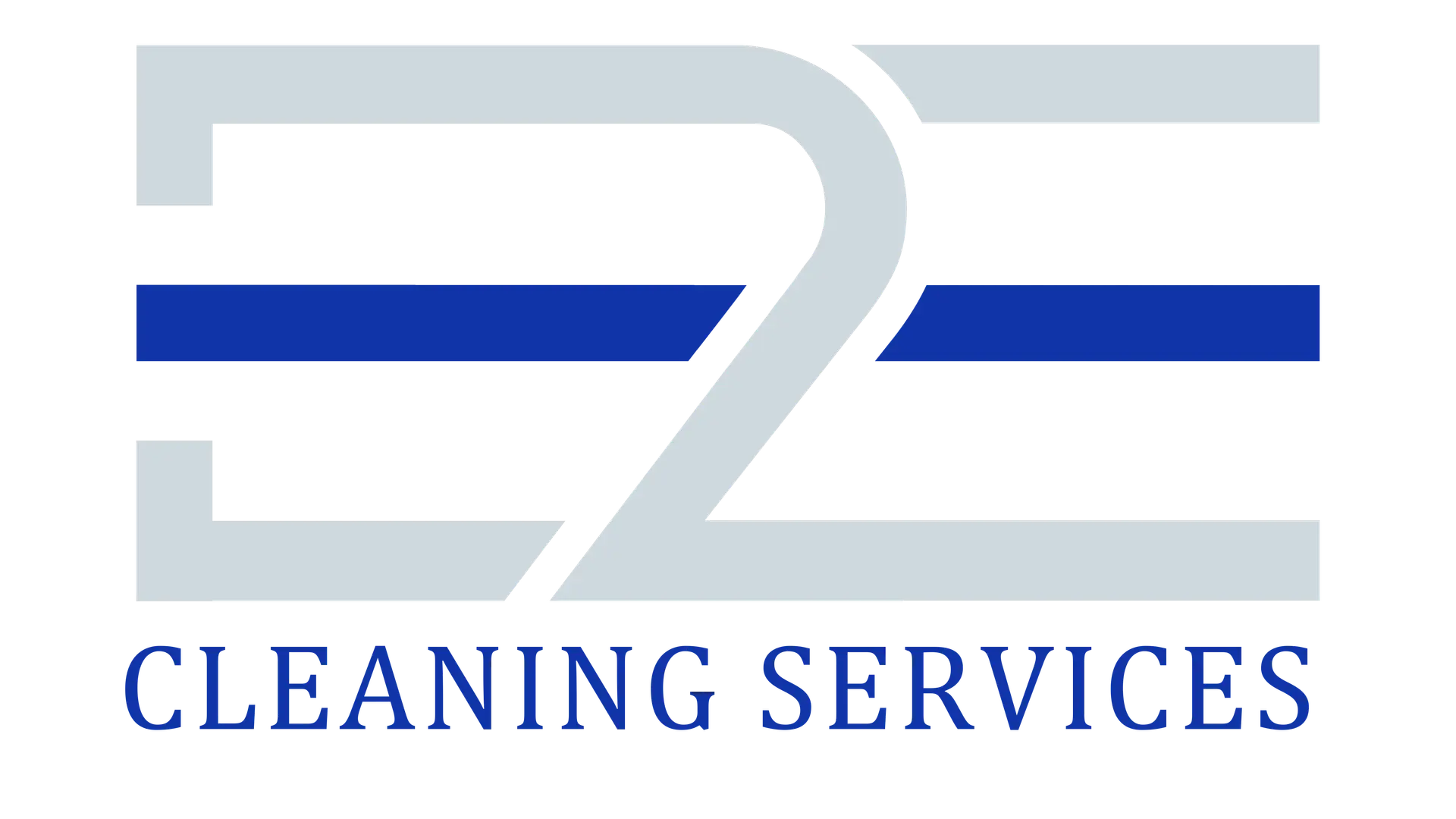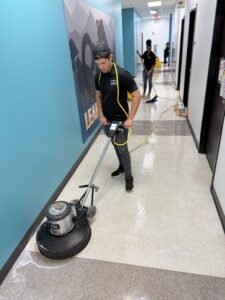The professional cleaning industry in Florida is serves as a critical component of humanitarian response operations and provides essential services in times of natural disasters, community crisis, and outbreaks.
Commercial cleaning businesses can enhance community resilience by providing specialized emergency response, assisting vulnerable populations, and partnering with relief agencies.
We will discuss the cleaning strategies that have been effective in the case of a disaster, and give you a clear roadmap on how to access these critical services when needed the most.
The Role of Professional Cleaning in Humanitarian Effort
During disasters, Florida’s professional cleaning services transform from routine commercial operations into specialized emergency response units. Such specialized services go beyond the normal janitorial tasks, they serve as front line guard against secondary health crisis that often follow a disaster.
Professional cleaning teams are used in the aftermath of hurricanes, floods and other emergencies using industrial-grade equipment and specialised training to mitigate immediate health risks. Their responsibilities include water removal using commercial grade pumps and dehumidifiers, drying of structures to eliminate dangerous moulds and use of EPA-registered disinfectants to eliminate pathogens in water.
Their work has far-reaching health consequences. In the absence of adequate sanitisation after flooding, communities face great risks of bacterial contamination, mould growth, and diseases transmitted by vectors on the air.
Professional cleaning crews use hospital-level disinfection measures in impacted zones paying special attention to:
- Comprehensive sanitisation of water-contaminated surfaces with quaternary ammonium compounds or disinfectants based on hydrogen-peroxide.
- HEPA filtration systems to eliminate air particulates and enhance the indoor air quality.
- Specialised biocide uses to inhibit the growth of moulds in construction materials.
- Full decontamination of food preparation areas to avoid outbreak of foodborne illnesses.
In addition to technical expertise, professional cleaning teams prioritize compassionate human touch towards vulnerable groups.
Disaster presents a disproportionate challenge to older adults, individuals with disabilities, and those with chronic health conditions. Specialized programs have been created by professional cleaning companies to focus on these individuals, which in most cases offers services at lower or no cost.
Such humanitarian cleaning efforts can go further to facilities serving the community’s most vulnerable residents. Homeless shelters, domestic-violence safe houses and community centres receive priority attention during emergency situations, ensuring these essential services remain operational when people need them most.
Professional cleaning companies recognize that proper sanitation is one of the basic human dignities that are even more crucial in times of crisis. By collaborating with community organisations, cleaning companies create mechanisms to determine the most needy individuals, organize the delivery of services, and make sure that no community member is left behind in the recovery process.
Types of Community Support Cleaning Services
Professional cleaning businesses in Florida have created specialized service divisions that are focused on different aspects of community support and disaster response. The services have specific protocols and equipment settings that are unique to the particular emergency situation.

Post-Hurricane Response Cleaning
Hurricane cleanup is one of the most common emergency cleaning situations in Florida. The operations tend to be systematic:
- Initial safety assessment and hazard identification
- Water removal by means of submersible pumps and industrial wet vacuums.
- Structural drying with commercial dehumidifiers and high‑velocity air movers
- Antimicrobial use with the use of electrostatic sprayers to cover the area fully.
- Cleaning and restoration of items to be considered salvageable.
- Odor remediation through thermal fogging or hydroxyl generation
Professional groups have portable generators, satellite communications, and self-contained water supplies that enable them to work in places where utilities are not available. They have the following equipment:
- Truck-mounted extraction units with the capacity to pump out thousands of gallons per hour.
- Commercial‑grade dehumidifiers with a moisture removal capacity of up to 30 gallons per day
- EPA-registered disinfectants that work against a wide range of pathogens.
- Water meters and thermal cameras to identify hidden water damage.
Flood Damage Management
Flooding poses special cleaning problems, not just those related to wind damage. Specialist cleaning crews deal with such issues with special methods:
- Elimination of porous materials that are contaminated and cannot be sanitized successfully.
- Disinfecting the structural elements by pressure washing.
- Therapy of subflooring and wall cavities to avoid concealed contamination.
- Application of antimicrobial sealant to avoid future mould growth.
- Implementation of rigorous biohazard disposal protocols for contaminated materials
Emergency Facility Support
Cleaning teams offer critical support services when community facilities are reused during disasters to provide emergency services:
- Preparation of the facility, thorough cleaning and disinfection.
- Establishment of sanitization stations and hygiene protocols
- Continued cleaning of the maintenance on expedited plans.
- Terminal cleaning and disinfection upon deactivation
- Cleaning of medical care areas in compliance with the healthcare standards.
Vulnerable Population Support
Specific programs that address vulnerable community support to coomunity members include:
- Complimentary cleaning services for cancer patients undergoing treatment
- Cleaning up after disasters for the elderly
- Biohazard cleaning for individuals with hoarding disorders
- Cleaning of immunocompromised persons
- Environmental modification for individuals with respiratory conditions
These services are usually run in formalized programs which stipulate certain eligibility requirements, application procedures and service provisions.
Sustainable professional cleaning companies are organizing their workflow to incorporate emergency response services and make community crisis assistance a part of the business value.
Building Partnerships for Greater Impact
The most effective programs to community-based cleaning activities are based on well-organized partnerships that maximize resource utilisation and make sure that services are provided to the neediest.
These types of collaborative models connect cleaning firms with organisations that are already integrated into community service networks.
Effective partnerships are usually characterized by formal agreements that describe:
- Service scope and expectations
- Response time commitments
- Resource allocation frameworks
- Funding mechanisms
- Communication protocols
- Training requirements
- Documentation standards
Local non-profit organisations are often used as the mediators, finding people and facilities in need of help and professional cleaning companies to provide the necessary technical skills and equipment. This separation of duties allows every entity to use its core competencies.
Healthcare partnerships are a form of collaboration that is especially effective while partnering with professional cleaning companies to deal with:
- Home cleaning for discharged patients.
- To assist patients throughout treatment, cancer treatment centres.
- Home health agencies, to ensure safe homes of home-bound people.
- Community clinics, to make facilities up to infection-control standards.
Government partnerships institutionalise the functions of cleaning firms in governmental emergency-response systems. These arrangements include:
- Pre-disaster contracts that take effect when emergency is declared.
- Emergency operations centre planning inclusion.
- Integration with municipal shelter operations
- Coordination with public health department initiatives
These types of partnerships tend to create pre-positioned supply caches and equipment staging areas so that in case of disasters, they can be deployed quickly. A large number of cleaning companies have special emergency-response teams, which are trained to undertake such mobilisations.
Corporate social-responsibility programs open up more partnership possibilities, as businesses fund cleaning services of community facilities or vulnerable people. Such plans offer predictable financing of humanitarian cleaning programs and businesses with significant chances to engage in the community.
The most effective partnerships are built before disasters strike, not during emergencies. These relationships are strengthened through regular joint training, community education programs, and collaborative planning during calm periods, making them highly effective when disaster actually occur.
How to Access and Support Humanitarian Cleaning Services
The community members in need of humanitarian cleaning service programs can access to such services through multiple channels, each with certain procedures and eligibility requirements.
For Individuals Needing Assistance
- Call local emergency management offices, which have lists of certified cleaning service providers in disaster response.
- Contact community service organisations, including United Way, which organises cleaning assistance programs on a regular basis.
- Discuss cleaning support programs with healthcare providers that patients with medical conditions may receive.
- Directly apply to cleaning agencies that promote community service programs.
- Seek help with specialised programs like Cleaning for a Reason that provides services to cancer patients or similar services.
For Organizations Seeking Partnerships:
- Find cleaning firms that have a well-established community support programs.
- Suggest particular collaboration models with well-defined responsibilities.
- Work out official memorandums of understanding terms of partnership.
- Establish joint training and preparedness activities.
- Establish communication protocols for emergency activation.
Partner With Us. Click Here
For Individuals Wanting to Support These Efforts:
- Volunteer with cleaning companies during community service events.
- Donate cleaning supplies to organisations that organize disaster response.
- Donate to non-profit organisations that finance cleaning support.
- Advocate for government funding for emergency cleaning programs.
- Share information about available services with vulnerable community members.
For Businesses Wanting to Contribute:
- Sponsor specific community cleaning initiatives through financial contributions.
- Donate equipment or supplies to professional cleaning teams.
- Provide facility space for volunteer training or equipment staging.
- Provide professional services (legal, accounting, marketing) to assist program activities.
- Develop employee volunteer programs with local cleaning programs.
Conclusion
Professional cleaning services fill the gap between technical skills and humanitarian empathy in the emergency response system of Florida. Their unique abilities make them more than just a service provider but an irreplaceable community support system in times of disaster and community health emergencies.
With climate change driving the occurrence and intensity of natural disasters on Florida communities, the role of professional cleaning in humanitarian response will keep growing. Progressive businesses are already increasing their emergency response capacity, creating special equipment configurations, and formalizing community partnership agreements.
The most effective models show that commercial cleaning knowledge can be used to respond to short-term crisis demands and help build community resilience in the long term.
Professional cleaning services, through formalized programs, strategic partnerships, and specific humanitarian initiatives, make sure that no member of the community is left without access to safe, sanitary living conditions in the face of disaster recovery.
These programs respect the dignity of every member of the community by acknowledging that cleaning is a basic human service and not a luxury, and that it fulfills the basic needs of the population in terms of health.
Their example is a perfect example of how business can be conducted in a way that it is in harmony with humanitarian principles and create examples of community care that go well beyond the conventional commercial relations.






